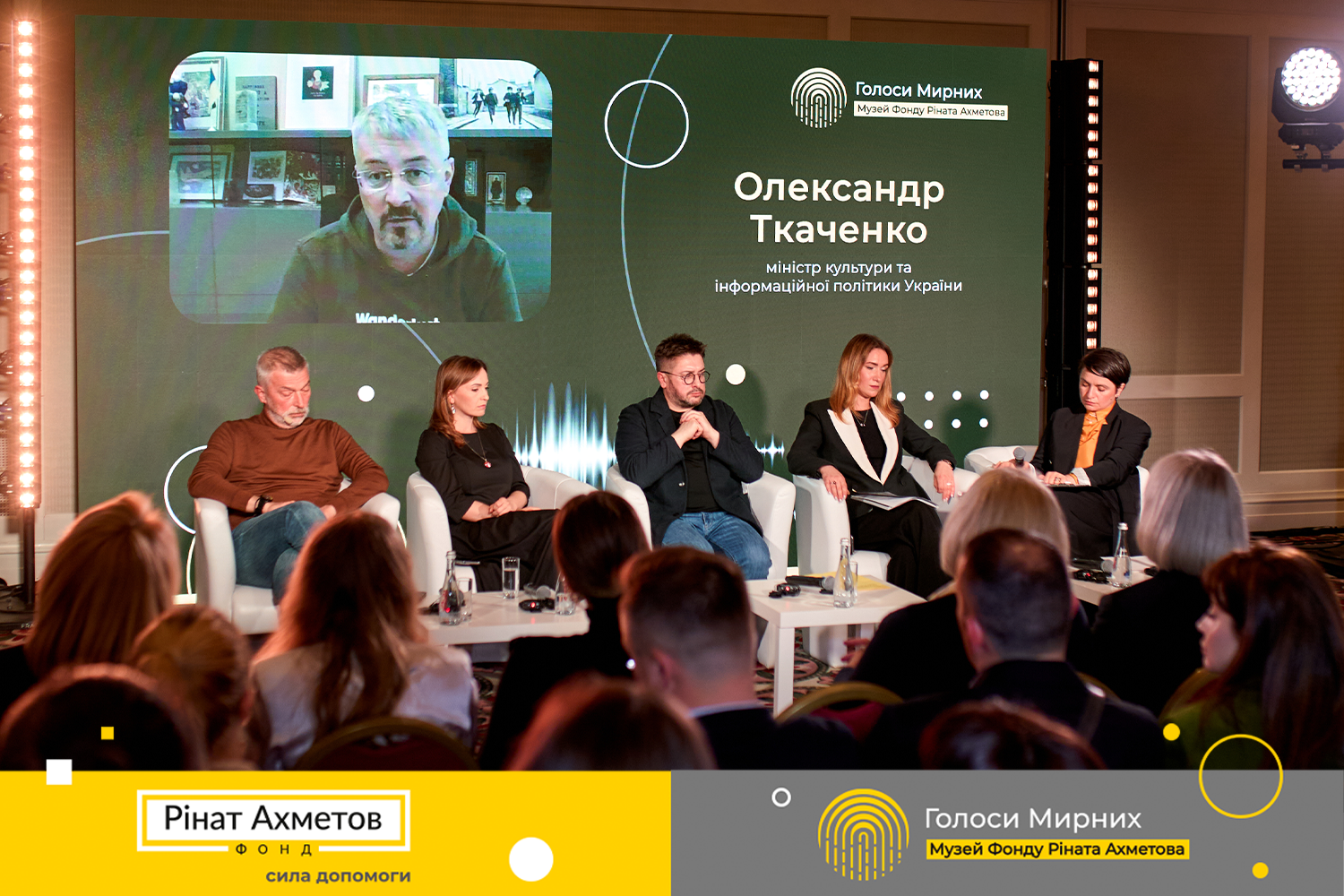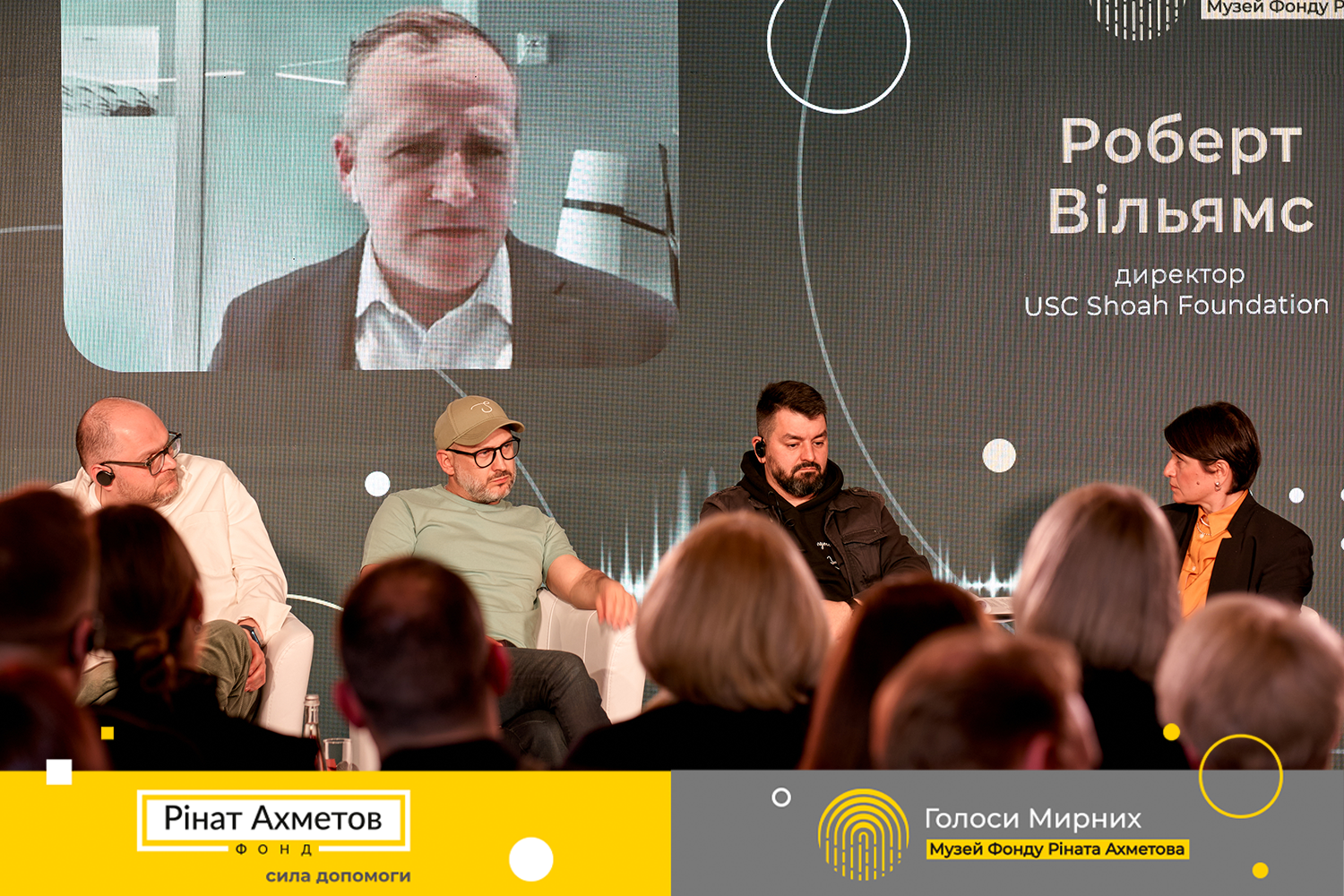On 27 April, the Museum of Civilian Voices of the Rinat Akhmetov Foundation organized a panel discussion in Kyiv on the topic What Ukrainian cinematography should be for prize winning? How to collect Oscars, Palm d’Or, Golden Globes and other prestigious awards?
Representatives of the Ukrainian film industry, world renowned film producers and directors, who already have a number of high-profile awards, discussed how to tell the world about the war, why Ukraine needs film awards, and what criteria are key for the recognition of Ukrainian cinema in the world.

Natalya Yemchenko, a member of the Rinat Akhmetov Foundation’s Supervisory Board, moderator of the panel discussion:
“We are a Museum. We are very good at collecting and keeping people’s stories, but now we are faced with the question of how to share them. Cinematography is the most powerful way to promote Ukraine in the world, but it is also one of the most difficult ways. The criteria for the development and success should be defined within the industry itself — and that is exactly what this meeting and this discussion were about. Without pooling efforts and without cooperation in the film industry and between everyone around it, it will be very difficult to win. And without victories in cinematography, our truth will remain unknown in the world.”

Serhiy Sozanovskyi, founder of FILM.UA:
“There is one key word, and this word is “own”. We protect our own (that is, everything that belongs to us). We fight for our own. In my opinion, any own story is a relevant story – if it is made professionally, with love and with a pure heart.”

Volodymyr Borodyanskyi, producer, co-founder of the Association of Ukrainian Producers:
“The victory of the Ukrainian cinematography is hidden in the answer to the question “for what.” We live in our own bubble, while we need to realize clearly which system the Ukrainian cinema is part of. It can be a propaganda system. It can be a system of humanitarian development — of Ukraine and its citizens.
I personally like the second option. It implies that we are part of the global film industry, part of people’s memory and part of the ability to resist.”

Oleksiy Sukhanov, ambassador of the Museum of Civilian Voices, actor, and TV host:
“War has faces, destinies, eyes, and words. And the main thing is the intonation, as words are nothing without intonation... The Museum of Civilian Voices of the Rinat Akhmetov Foundation is, in fact, the DNA of Ukrainian pain. But the wisdom of any country is not in the number of tragedies lived through, but in the ability to be conscious and mindful of these tragedies.”

Daria Slobodianyk, editor of the culture section at Vogue UA:
“In the first days of the full-scale invasion, we started to share the stories of ordinary Ukrainians living through the war. We published hundreds of stories, including those in English. At some point, we noticed that foreigners were less interested in the topic of war. We began to look for an answer why it was so. And we realized that, first of all, the world actually knows very little about the life of modern Ukraine — our culture, fashion, and art...
From our side, we tend to fill this gap. Ukraine and Ukrainians have something to surprise the world with. For one of the following issues, we have combined the stories of very famous people and those who rarely appear on our pages. And broadly speaking, the path to Ukraine’s victory in the information space lies through honesty.”

The participants of the discussion were:
— Volodymyr Borodyanskyi, producer, co-founder of the Association of Ukrainian Producers
— Serhiy Sozanovskyi, founder of FILM.UA
— Anna Machukh, director of the Ukrainian Film Academy
— Yulian Ulybin, director of the films “Children of Bomb Shelters”, “Dram”
— Oleksiy Sukhanov, ambassador of the Museum of Civilian Voices, actor, TV host
— Daria Slobodianyk, editor of the culture section at Vogue UA
— Volodymyr Yatsenko, producer of the films “Luxembourg, Luxembourg”, “Wild Field”, “Atlantis”, “Going Home”, the first representative of Ukraine at Eurimages, and a serviceman of the Armed Forces of Ukraine.
Volodymyr Yatsenko, producer of the films “Luxembourg, Luxembourg”, “Wild Field”, “Atlantis”, “Going Home”, the first representative of Ukraine at Eurimages, and a serviceman of the Armed Forces of Ukraine.
“We should produce films that would be understandable to everyone, not just us. This is our meta-goal, and it is associated with business. Where there is big money, there is a lot of competition. And this is our challenge – to make films with our Ukrainian identity interesting for others.

What is the victory of Ukrainian cinematography? This is the representation of Ukraine in culture. Representation — and a certain influence. Now in Japan they are making toys with Ukrainian soldiers. This is one of the examples.”
Anna Machukh, director of the Ukrainian Film Academy
“I would like to thank the Foundation for this wonderful initiative that is useful for the entire film industry. In particular, for those who create documentary films and those who write scripts – there is no need to invent or think anything out here. It is enough to turn to the Museum and familiarize yourself with the stories.
There are three ingredients for the victory of Ukrainian cinematography. First, these are experts who know how to produce content that is interesting to viewers – and earn money from it. Secondly, it is the state support. It is about supporting documentary filmmaking and festival filmmaking, and lobbying for its presence on the relevant market. The third – and the most important one – is the Victory of the country in the war. Ten percent of the film industry representatives are in the war. Many film studios donated their equipment for the needs of the front.”

Yulian Ulybin, director of the films “Children of Bomb Shelters”, “Dram”
“We have been in the fields since the first day of the full-scale war. We produce high-quality artistic documentaries. We learned to sleep in bulletproof vests, learned not to be afraid of what is around us, and to film as quickly as possible. There is no death and blood in our films. The West does not want to see death.
As an example, we can show children’s testimony — so that a video could become evidence for The Hague.”

 The following participants joined the event online:
The following participants joined the event online:
— Oleksandr Tkachenko, Minister of Culture and Information Policy of Ukraine
— Yevheniy Afineyevskyi, director, producer of the film “Freedom On Fire: Ukraine’s Fight for Freedom”
— Bonnie Abaunza, impact strategist, founder of Abaunza Group
— Robert Williams, director of the USC Shoah Foundation
— Bernard-Henri Lévy, director of the film “Glory to Ukraine”, philosopher
Reference:
The Museum of Civilian Voices of the Rinat Akhmetov Foundation is the world’s largest collection of stories from Ukrainian civilians who suffered from the war. Currently, the Museum’s archive has more than 65,000 stories.
Every story about the war matters. To preserve the memory for a better future, share your story on the portal of the Museum of Civilian Voices of the Rinat Akhmetov Foundation https://civilvoicesmuseum.org/ or via a toll-free hotline (800) 509 001






.png)



